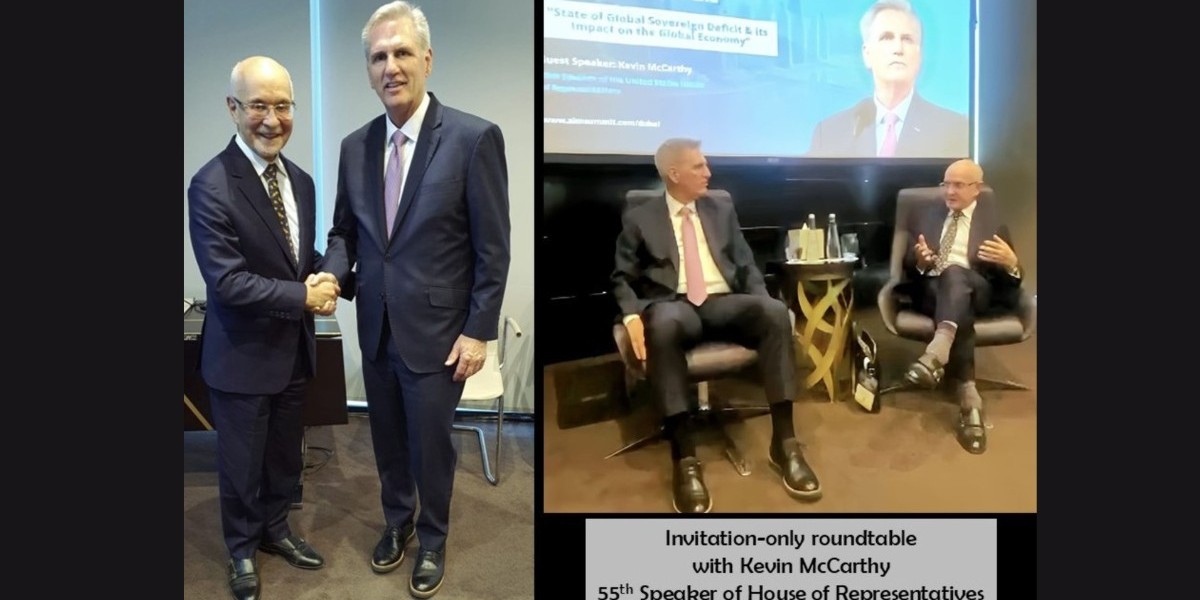Kevin McCarthy on Sovereign Debt, Political Polarization Emerging Markets at AIM Summit Dubai
The AIM Summit in Dubai, a distinguished gathering of global policymakers, economists, and investors, recently hosted a compelling roundtable featuringKevin McCarthy, the 55th Speaker of the U.S. House of Representatives. Alongside financial thought leaderDavid Gibson-Moore, the discussion addressed pressing global economic challengesmost notably theglobal sovereign debt crisis, the increasingpolitical polarization in Western democracies, and the volatility inemerging markets.
The Urgency of Sovereign Debt Crisis: A Global Concern
One of the central themes of the summit was theKevin McCarthy sovereign debt discussion, highlighting the unsustainable debt levels plaguing both developed and developing nations. With interest rates rising globally and inflation eating into national budgets, McCarthy emphasized the need for fiscal responsibility.
As part of the broaderglobal sovereign debt crisis analysis, he pointed out that unchecked borrowing by governments could lead to systemic risks, affecting not just economies but also international relations and financial stability. The current debt-to-GDP ratios in several Western economies are approaching post-war highs, a red flag for investors and citizens alike.
The Cost of Division: Political Polarization in Western Democracies
McCarthy also addressed the growingpolitical polarization in Western democracies, calling it a barrier to economic reform and cross-party cooperation. He noted that gridlocked legislatures, fueled by ideological divisions and media echo chambers, have made it increasingly difficult to enact meaningful fiscal policies.
This political stagnation exacerbates the challenges of debt management and slows down progress on crucial issues such as healthcare, education, and climate change. The summit echoed support forCross-Party Collaboration Initiatives, emphasizing that bipartisan action is essential for long-term global stability.
The EM-ification of the US Economy
A striking concept presented was theEM-ification of the US economy, a term coined to describe how the U.S., traditionally viewed as a global economic pillar, now exhibits traits commonly associated withemerging markets. These include high political instability, rising social inequality, and a weakening of institutional credibility.
McCarthy, along with panelists like David Gibson-Moore, explored how this shift affects international investor sentiment. If confidence in the U.S. wanes, it could have a ripple effect across global markets, similar to the way shocks in developing countries often impact global growth.
Emerging Market Trends at AIM Summit
Theemerging market trends at AIM Summitpainted a complex picture. While many EMs face challenges such as capital outflows, currency devaluation, and regulatory unpredictability, they also offer unprecedented growth opportunities. African economies, Southeast Asia, and Latin America were highlighted as hotspots for investment in renewable energy, technology, and infrastructure.
McCarthy stressed the importance of strong governance and regional partnerships in unlocking the potential of these markets. Thechallenges of economic volatility in emerging marketscan be mitigated through sound macroeconomic policies, foreign direct investment, and sustainable development goals.
The Global Economy and Financial Volatility
Participants at the summit explored the impact ofglobal economy and financial volatility, amplified by geopolitical events such as the Russia-Ukraine war, Middle East tensions, and U.S.-China economic rivalry. McCarthy warned that central banks must navigate a narrow path between controlling inflation and supporting growth, a dilemma that adds further complexity to sovereign debt issues.
The increasing interdependence of global economies means that volatility in one region can now more easily destabilize markets across continents. This interconnectedness underscores the need for coordinated global policy responses.
US Agricultural Sector and Urban Expansion
On a more positive note, McCarthy highlighted key U.S. assets such as itsagricultural sector and urban expansion potential. These elements could support long-term economic growth, provided the country improves infrastructure, enhances trade policies, and invests in technology.
Farmland innovation, smart city development, and sustainable urban planning were discussed as avenues through which the U.S. could regain its competitive edge.
Collaboration Is the Way Forward
The AIM Summit provided a timely platform to reflect on the crucial need for collaborationnot just between political parties but also among nations. As the world confronts rising debt, polarizing politics, and fragile markets, leaders likeKevin McCarthy and David Gibson-Moore at AIM Summit Dubaiserve as reminders that dialogue and data-driven policymaking remain essential.
Conclusion
The discussions at AIM Summit offered a sobering yet constructive analysis of theglobal sovereign debt crisis,emerging market instability, and the consequences ofpolitical polarization in Western democracies. Kevin McCarthys perspectives were not only insightful but also timely, as the world searches for a path forward through growing complexity.
FromCross-Party Collaboration Initiativesto strategic investments in agriculture and innovation, the path to stability lies in informed and inclusive leadership. As McCarthy noted, "Economic challenges are not red or bluethey are global, and solving them requires global unity."
FAQs
1. What is the main focus of Kevin McCarthy's speech at AIM Summit Dubai?
Kevin McCarthy focused on the global sovereign debt crisis, political polarization in Western democracies, and the risks and opportunities in emerging markets.
2. What does EM-ification of the US economy mean?
It refers to the U.S. exhibiting economic and political traits similar to those in emerging markets, including instability, weakening institutions, and volatility.
3. Why is political polarization a threat to economic stability?
Polarization hinders bipartisan cooperation, making it difficult to implement long-term fiscal reforms and economic policies necessary for stability.
4. What trends in emerging markets were highlighted at the AIM Summit?
Investment opportunities in technology, infrastructure, and renewable energy, along with the need for good governance and stable macroeconomic environments.
5. How can countries address sovereign debt issues?
Through fiscal discipline, growth-oriented policies, debt restructuring mechanisms, and global cooperation.







